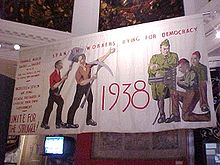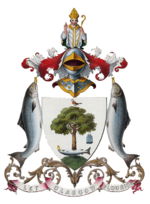- Culture in Glasgow
-
The city of Glasgow, Scotland, has many amenities for a wide range of cultural activities, from curling to opera and from football to art appreciation; it also has a large selection of museums that include those devoted to transport, religion, and modern art. The city often hosts exhibitions and events in these areas. Glasgow has three major universities. each involved in creative and literary arts, and the city has the largest public reference library in Europe in the form of the Mitchell Library. Scotland's largest newspapers and national television and radio companies are based in the city.
Contents
Art in Glasgow
The Kelvingrove Art Gallery and Museum has a famous collection of paintings including many old masters, Dutch,Italian, French Impressionists, etc. and the Scottish Colourists, and Glasgow Boys. The Hunterian Museum and Art Gallery, of the University of Glasgow, has what is considered to be the best collection of Whistler paintings in the world. The Burrell Collection is an eclectic collection of art and antiquities donated to the city by Sir William Burrell and housed in an award-winning museum in the Pollok Country Park. The People's Palace museum in Glasgow Green reflects the history of the city and its people, focussing on the working class of Glasgow. Glasgow School of Art designed by Charles Rennie Mackintosh continues its pre-eminence in design and architecture, including its Digital Design Studio across the River Clyde in the House for an Art Lover, in Bellahouston Park. The Gallery of Modern Art is on Royal Exchange Square, just off George Square.
Glasgow's museums
Glasgow's museums and galleries include:
- Kelvingrove Art Gallery and Museum (Recently re-opened)
- The Burrell Collection
- Collins Gallery
- Fossil Grove
- The Gallery of Modern Art (GOMA)
- Glenlee, a museum ship
- Hunterian Museum and Art Gallery
- The Lighthouse, Scotland's Centre for Architecture, Design and the City
- McLellan Galleries
- Museum of Transport
- The People's Palace
- Pollok House
- Provand's Lordship
- St Mungo Museum of Religious Life and Art
- Scottish Football Museum
- Scotland Street School Museum
- National Museum of Scottish Country Life
- National Museum of Piping
Libraries
- Glasgow University Library
- Glasgow Women's Library
- Mitchell Library
- Stirling's Library
Entertainment
Scotland's leading cultural institutions, Scottish Opera, Scottish Ballet and the Royal Scottish National Orchestra are based here as is the BBC Scottish Symphony Orchestra. The Royal Scottish Academy of Music and Drama is one of Britain's longest established performing conservatoires, and its recently opened Alexander Gibson Opera School is the first purpose built opera school in Britain. The National Piping Centre is an international teaching centre. The city also has a longstanding and lively popular music scene based around venues such as the SECC, the Carling Academy, Barrowlands, Cosmopol and King Tut's Wah Wah Hut. Glasgow is the first city in Britain to be awarded the UNESCO City of Music accolade. Glasgow also hosts Orange Order and Apprentice Boys of Derry parades, during the spring and summer months.
Theatres
Glasgow has a number of theatres, including:
- Citizens Theatre
- Crawford Theatre
- Cottier Theatre (currently closed)
- Gilmorehill G12
- King's Theatre
- Mitchell Theatre
- Oran Mor
- Pavilion Theatre
- Ramshorn Theatre
- RSAMD
- Tramway, home of Scottish Ballet
- Tron Theatre
- Theatre Royal, home of Scottish Opera
- National Theatre of Scotland
Concert Halls
- Glasgow City Halls, home of the BBC Scottish Symphony Orchestra
- The Fruitmarket
- Glasgow Royal Concert Hall
- Scottish Exhibition and Conference Centre
- Clyde Auditorium which also stages theatre shows
- Henry Wood Hall, home of Royal Scottish National Orchestra
Performing arts
- The Arches (Glasgow)
- Centre for Contemporary Arts (CCA)
- City of Glasgow Chorus
- The National Piping Centre
Parks
Amongst the city's parks are:
- Bellahouston Park
- Glasgow Green
- Kelvingrove Park
- Victoria Park
- Maxwell Park
- Pollok Country Park
- Queen's Park
- Rouken Glen
- Glasgow Botanic Gardens
- Alexandra Park
- Linn Park
- Springburn Park
Festivals
As part of Glasgow's cultural renaissance, Glasgow is host to a variety of festivals throughout the year:-
- Celtic Connections - January
- Glasgow Film Festival - February
- Glasgow International Comedy Festival - March
- Glasgow International Festival (Visual Arts) - April
- Glasgow Art Fair - April
- Charles Rennie Mackintosh Festival
- Big Big Country - May (last held in 2006)
- West End Festival - June
- Lord Provost's Procession (discontinued)
- Glasgow International Jazz Festival - June
- North Glasgow International Festival (last held in 2005)
- Bard in the Botanics - July
- Glasgow's River Festival - July
- Glasgow Mela - June
- Piping Live! - August
- World Pipe Band Championships - August
- Merchant City Festival - September
- Glasgay! - November
- Glasgow's Hogmanay - December
- Glasgow Orange Parades
Exhibitions
The city was host to the three Great Exhibitions at Kelvingrove Park, in 1888 (International Exhibition (1888)), 1901 (Glasgow International Exhibition (1901)) and 1911 (Scottish Exhibition, Art and Industry). It later hosted the Empire Exhibition in 1938 and the Industrial exhibits of the Festival of Britain at the Kelvin Hall in 1951. More recently it held the Glasgow Garden Festival in 1988 and was European Capital of Culture in 1990, National City of Sport 1995-1999, UK City of Architecture and Design 1999 and European Capital of Sport 2003. The city will also host the 2014 Commonwealth Games.
Contemporary music
Glasgow has many live music pubs, clubs and venues. Some of the city's main venues include the Glasgow Royal Concert Hall, the SECC and King Tut's Wah Wah Hut (where Oasis were spotted and signed by Glaswegian record mogul Alan McGee), the Queen Margaret Union and the Barrowland, a historic ballroom, converted into a live music venue. More recent mid-sized venues include ABC and the Carling Academy, which play host to a similar range of acts. Numerous small venues, cafes and bars play host to the many smaller local and touring bands which regularly play in the city.
Glasgow is also home to a thriving electronic music scene, with a particularly strong reputation for techno and house music. Venues like the Arches and the Sub Club, record labels such as Soma and Chemikal Underground and clubnights such as Optimo have supported this strong underground movement for the past two decades in the city.
The city also boasts a flourishing experimental music scene, and plays home to such luminaries as Alex Neilson and Richard Youngs. Glasgow hosts the longrunning Install and Subcurrent annual festivals, which have featured underground luminaries such as Gustav Metzger and Tony Conrad, as well as reclusive American musician Jandek's first ever live performance.
In recent years, the success of bands such as Franz Ferdinand, Belle & Sebastian and Mogwai has significantly boosted the profile of the Glasgow music scene, prompting Time Magazine to liken Glasgow to Detroit during its 1960s Motown heyday.[1]
The annual Triptych festival musical festival has featured performances from such epochal figures as Stockhausen, Terry Riley and Einstürzende Neubauten.
References
- ^ Gerard Seenan (September 4, 2004). "Rock bands inspire Belle epoque for Glasgow scene". The Guardian. http://arts.guardian.co.uk/news/story/0,11711,1297055,00.html. Retrieved 2007-07-09.
See also
- Glasgow Art
Categories:- Culture in Glasgow
- Scottish culture by city
Wikimedia Foundation. 2010.


